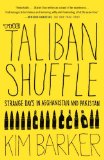Summary | Excerpt | Reviews | Beyond the Book | Readalikes | Genres & Themes | Author Bio

Strange Days in Afghanistan and Pakistan
by Kim Barker
When did everyone mess up? Many times, on all sides, but March 2003 is as good a start as any. From the beginning, the numbers were absurd: Post-conflict Kosovo had one peacekeeper for every forty-eight people. East Timor, one for every eighty-six. Afghanistan, already mired in poverty, drought, and more than two decades of war, with little effective government and a fledgling army that was hardly more than a militia, had just one peacekeeper for every 5,400 people. Then the foreigners cheated on Afghanistan. They went to Iraq.
Had they known anything about the country at all, they would have known that this was a really bad idea. Afghanistan was the so-called Graveyard of Empires, a pitiless mass of hard mountains and desert almost the size of Texas that had successfully repelled invaders like the Brits and the Soviets and seemed amenable only to the unforgiving people born to it. Men learned to fight like they learned to breathe, without even thinking. They fought dogs, they fought cocks. They fought tiny delicate birds that fit in a human hand and lived in a human coat pocket, and they bet on the results. They fought wars for decades until no one seemed to remember quite what they were fighting for. The national sport was essentially a fight, on horseback, over a headless calf or goat. Over the years, whenever Afghan men would tell me that they were tired of fighting, looking weary and creased, I would have only one response: Sure you are.
But now, on this road trip, I didn't worry about any of that. I was like a child, happy with my picture, showing it repeatedly to Farouq, who repeatedly laughed. Hours of bone-crushing road after leaving my first genuine warlord, our driver, Nasir, pulled into Khost and the so-called hotel. It was a second-floor walk-up on Khost's dusty main street, a place that looked as if a gun battle might break out at any second, as if High Noon could be filmed at any hour. Khost was a small city just over the border from Pakistan's tribal areas, the semi-autonomous region where insurgents and criminals could roam freely. In Khost, as in the tribal areas, laws were more like helpful hints. Everyone seemed to have a weapon, even the two men sleeping on the hotel balcony, fingers twitching near their triggers. We walked past a room where two Afghan journalists had holed up. They were friends of Farouq, but they gently closed the door on us. I didn't pay much attention. Outside the window in my room, I tried to set up a satellite dish to make a phone call, but the power was out, as usual, and the sun was setting. The satellite phone didn't work. Nothing worked. I grew exasperated.
"Damn it," I announced.
"Kim," Farouq said outside my door.
"This stupid satellite phone won't work. There's no power."
Farouq walked in and tried to get me to focus. "Kim. We need to talk."
"What? When does the stupid power come on?"
"Kim. My two friends, the journalists you just saw, they were both held hostage for four days by Pacha Khan. He threatened to kill them because they worked for the American media, and the Americans killed his son."
This stopped me. "You're kidding me."
Farouq told me that the men had only been freed with the intervention of President Hamid Karzai. I envisioned returning the same grueling way we came, seven hours, most of which passed through Pacha Khan territory.
"Can we drive back to Kabul another way?" I asked.
Farouq thought about it.
"That would take eighteen hours. Through really bad roads and dangerous areas. I think we'll be OK. You're a foreigner. Pacha Khan would be afraid to kidnap you. I just thought you should know. For your story."
Eighteen hours on punishing roads versus seven hours of slightly less punishing roads and the bonus potential of being kidnapped. That was a reality check, one of many I would have. I said I would think about the trip. The next day, we visited a man who had recently been released from the U.S. detention center in Guantánamo Bay, Cuba. He was a taxi driver and happily showed us his stereo, music, and videos and talked of his love for the movie Titanic, proof he wasn't a member of the Taliban, which under the guise of Islam had banned all such frivolities during their five years in power. He was oddly not upset at the Americans, despite being held in Guantánamo for more than a year in what all sides acknowledged had been a mistake. His family welcomed us. I sat in a room with the women, where no strange man, including Farouq, could go. With no translator, we smiled stupidly at one another. The women yanked off my headscarf and marveled at the state of my short brown hair, which resembled a 1970s home permanent gone horribly wrong. One tried unsuccessfully to brush it.
Excerpted from The Taliban Shuffle by Kim Barker. Copyright © 2011 by Kim Barker. Excerpted by permission of Doubleday, a division of Random House, Inc. All rights reserved. No part of this excerpt may be reproduced or reprinted without permission in writing from the publisher.
Your guide toexceptional books
BookBrowse seeks out and recommends the best in contemporary fiction and nonfiction—books that not only engage and entertain but also deepen our understanding of ourselves and the world around us.